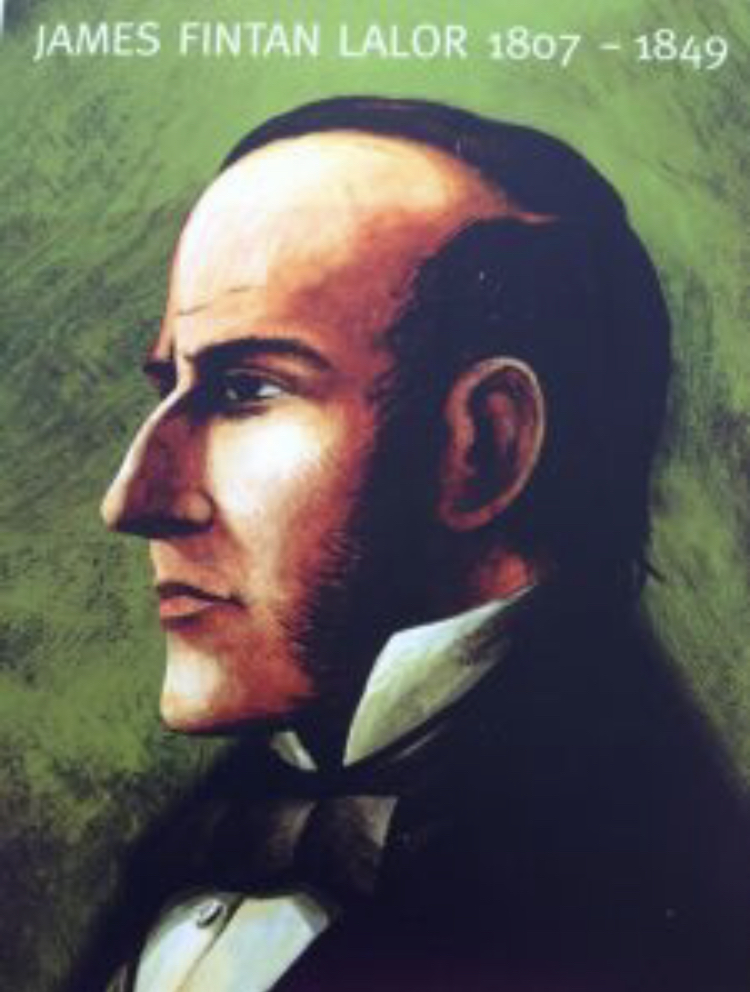To mark the 132nd anniversary of the Revolutionary Socialist Republican James Fintan Lalor, a young Irish Socialist Republican pays tribute to him with a new biographical article.
Early Life and education
James Fintan Lalor was born in Tenakill House in Raheen County Laois on March 10th 1807 to Patrick Lalor and Anne Dillon. His father Patrick was elected the first Catholic MP for laois in Westminster in 1832 following the Catholic emancipation act of 1829.
As a child Lalor suffered a back injury with left him with health problems, it is believed this is why up until the age of 17 Lalor was educated from home. Following his home education he went to St Patrick’s College Carlow where he studied chemistry classics and law. While in college Lalor became ill once again and had to return home in February 1826.
Early Adult life
Many details of Fintan Lalors early adult life remain unverified to this day. It has been rumoured that he spent some time in France however there is no evidence of this and nothing in any of his writings to support this claim. It is also said he got a job as an apprentice to a local surgeon Dr John Jacob in Portlaoise County hospital and that when Dr Jacob died in June 1827 he was replaced by his son with whom Lalor did not get on with and as a result left his work in the hospital to go work in a a chemistry lab, again however there is no absolute way of verifying this.
Political activism
At a public meeting in February 1831 in Portlaoise Lalors father Patrick declared that he would “never again pay tithes, that he would violate no law; that the tithe men might take his property, and offer it for sale; but his countrymen, he was proud to say, respected him, and he thought that none of them would buy or bid for it if exposed for sale”
( Tithes were an obligation to pay 10% of the value of agricultural produce for the upkeep of the protestant Church).
This was the beginning of what has became known as the Tithe war and the beginning of Lalor and his brothers becoming politically active.
However it was not the Tithe war but the land question and the power of landlords to evict Irish tenants off the land which got Lalor further involved in politics and it was suggested that in the 1830s he made contact with William Conner an agrarian reformer in his native county of Laois. The evidence around this suggestion is obscure and cannot be verified however it is clear from the writings of Lalor where he advocated rent strikes and active resistance to evictions that Conner who had an influence on his political views.
Rejection of the repeal association
Following Daniel O’Connells split with the Whig party (now the Liberal Party) and his reorganisation of the repeal association Lalors father and brothers supported the new repeal association, however he himself rejected it as the repeal association which ruled out physical force as a tactic. This causes disagreements between him and his father and he eventually left home in 1844 going first to Dublin and then to Belfast before eventually returning in 1846.
The years of the genocide
As the genocide of 1845-52 unfolded Lalors views became more radical with Lalor developing Socialist Republican and Proto marxist ideas that can be seen in his writings and it was around this time that Lalor became a Young Irelander. Throughout the years of the genocide Lalor was involved in the organization of rent strikes. He also wrote several letters that were published in the nationalist news paper “the nation”, in these letters he was clear that he was in favour of not only Irish independence but an Irish Republic built on a new type of system that put power firmly in the hands of the people, Lalor also called for the dissolution of the pre existing land system with all property been given back to the people, he urged landlords to show their allegiance to Ireland by helping to build a new social order and warned then that if evictions continued revolution might follow. In other pieces Lalor also began to expand on how these new land systems might be implemented. Lalor later moved back to Dublib to help edit the Irish Felon another nationalist paper of the time.
Arrest and final article
Following raids on the offices of the Irish Felon seeking evidence for the trial of John Martin Lalor headed to Tipperary. Some of Lalors writings were used in the indictment against John Martin and in response Lalor took responsibility and asked that the charges against John Martin be dropped, this was however refused.
In his final article entitled “the clearing decks” wrote on July 22nd 1848 Lalor stated “Any man who tells you that an act of armed resistance—even if offered by 10 men armed with stones—any man who tells you that such an act of resistance is premature, imprudent or dangerous— any and every such man should at once be spurned, spat at. For remark you this and recollect it, that somewhere, and somehow, and by somebody a beginning must be made, and that the first act of resistance is always and must be ever premature, imprudent and dangerous.”
Six days later on July 28th the eve of the Young Irelanders Rebellion at Farranroy, Lalor was arrested and imprisoned until November 1848 when he was released due to ill health.
Second uprising
In 1849 Lalor set about organising another uprising in Tipperary and Waterford, some of their forces under the command of Joseph Brennan and John Savage managed to attack an RIC barracks at Cappoquin Co.Waterford however other units did not have the numbers to take much action within their various districts, though a Guerrilla campaign was maintained for some period.
Death
3 months later in December of 1849 Lalor passed away at the age of 43 and is now buried in Glasnevin cemetery alongside many of Irelands patriot dead.
Conclusion
132 years on from his death James Fintan Lalor remains a legendary figure among Socialist Republicans of today, who take great inspiration from both his writings and his actions. There can be no doubt among anyone that James Fintan Lalor was a giant of Socialist Republicanism who despite facing difficulties with his health played a key role in the ongoing struggle for national liberation and Socialist revolution.

